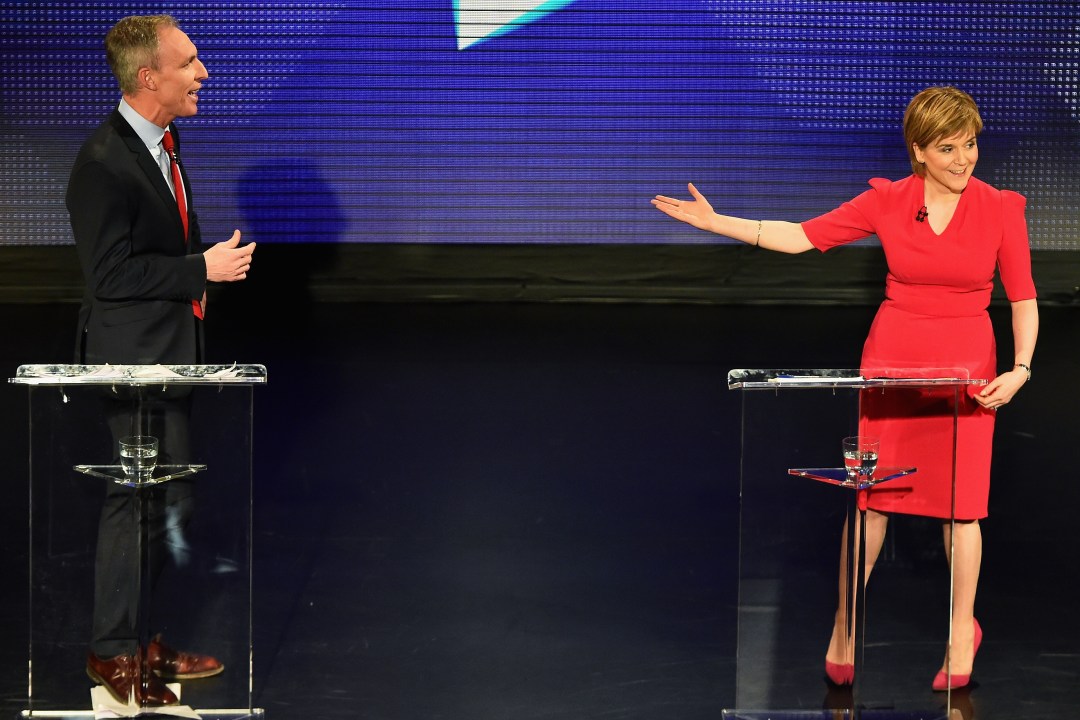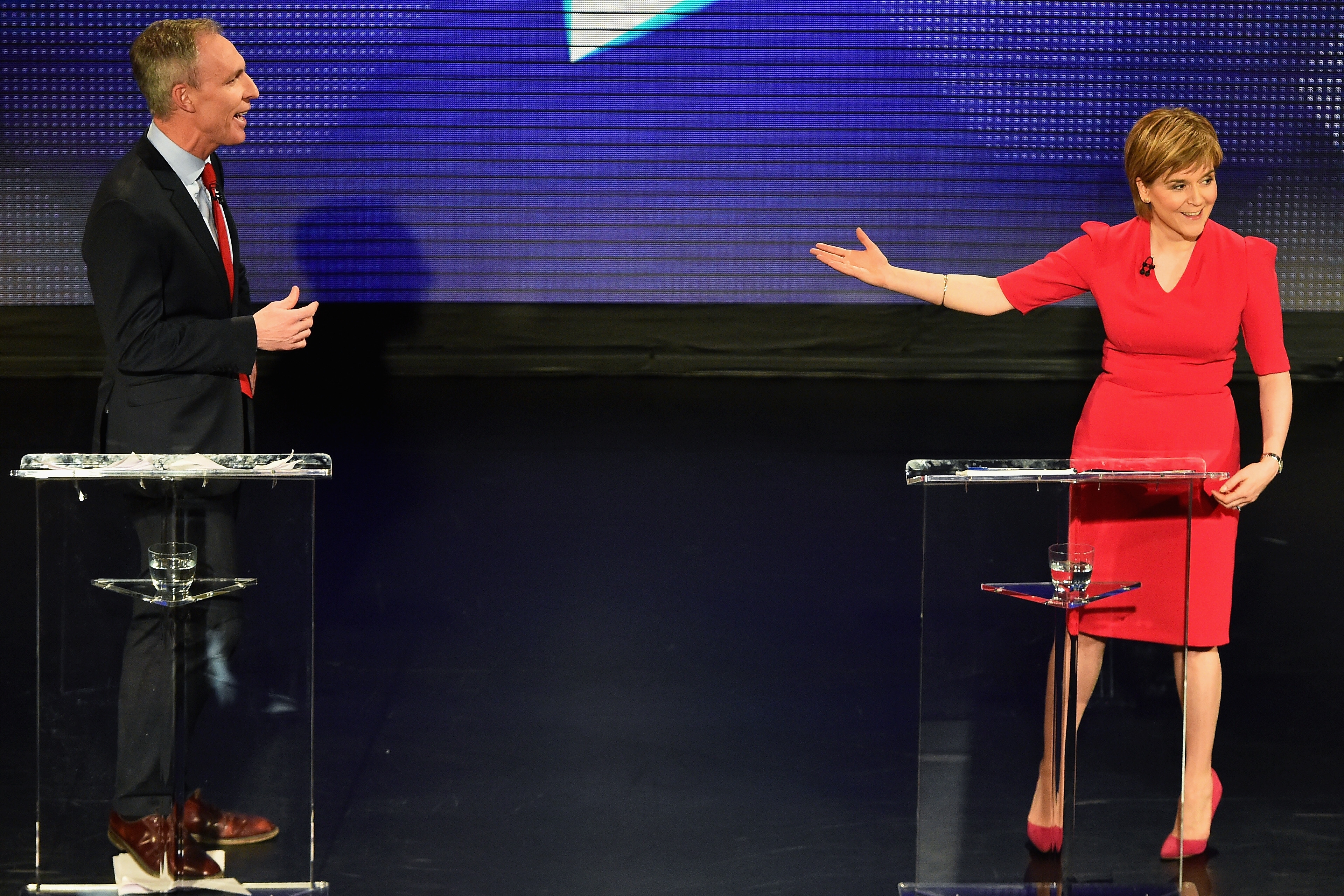It’s nice to be noticed. I cannot recall the Scottish portion of a UK general election ever exciting this much interest from folk unfortunate enough to live south of the Tweed.
I don’t blame southrons for wondering just what in god’s name is happening up here, however. These are uncharted waters for all of us. And yet, despite that, it is a little less revolutionary than it seems at first. Consider these numbers: 39, 33, 29, 32. That’s the share of the constituency vote won by Labour in the four elections to the Scottish parliament. And then there are these numbers: 29, 27, 33 and 45. That’s the share won by the SNP.
So this Westminster election is beginning to look rather like a Holyrood election and that in turn means that 35 percent of the vote might be Labour’s ceiling, not its floor. Which changes everything.
The Scottish people have not, on the whole, been very impressed by the performance of their parliament but, rather more importantly, they very much approve of its existence and they would like it to play a larger role in the life of the nation. Holyrood, not Westminster, is increasingly the immediate focus of our politics.
That doesn’t, of course, render Westminster irrelevant. Far from it. Nevertheless the imperial parliament is no longer the only show. Holyrood’s mere existence makes Westminster seem more distant, more remote, less relevant.
And that creates a structural advantage for the party that clamours for more powers for Holyrood. The party that says it “stands up for Scotland”. The party that wraps itself in the flag. That party, as you know, is the Scottish National Party.
It is always in opposition even when it is also in government. You might, at first glance, think it will prove difficult to oppose a Labour government in London that depends upon SNP votes on crucial issues but that reckons without the SNP’s endless flexibility and its ability to survive contradictions that might cripple other parties. Fighting the SNP is like wrestling smoke.
The Nationalists, you see, are positioning themselves to be in opposition in London even as they exercise greater power than they have ever previously enjoyed. They will be a kind of internal opposition, pledged to keeping Labour “honest”. That’s gives them room to make impossible demands. Demands, in fact, that the nationalists know cannot and will not be met. They’re not designed to be met.
So they prattle on about modest spending increases as an alternative to austerity knowing that doing so both appeals to “traditional” Labour voters and usefully distances the SNP from a Labour government in London. It allows the nationalists to wriggle free from responsibility for their votes. They might put Labour into office but not into real power. We asked Labour to be true to their traditions; they refused. That’s not our fault. Not our problem.
And if all this annoys English voters, well, that’s no disaster either. The SNP will enjoy the piquant irony of propping up a Labour government that lost the English portion of this election. How, old boy, do you like them apples? Not very much, I’ll wager.
That allows the SNP to run a 2016 campaign for the Scottish parliament that will be a form of concern-trolling. See, Labour could have been something but, instead and yet again, they’ve just let you down. It’s not about you, it’s them.
Labour might not be finished yet but they are discovering that when politics is based on identity not class interest the game changes and becomes one that is very much harder to play. It doesn’t help that the SNP will cheerfully copy Labour policy if they think it useful to do so. A policy clinch allows the Nats to argue that you can get all the things you like about Labour but with added Scottishness on top. And, of course, at other moments it is convenient to denounce Labour as neoliberal sell-outs (Red Tories!) who have betrayed themselves and, worse, you.
It is an enviable position in which to be in. Jim Murphy might wrap himself in the flag too but he can never out-patriot the patriotic party (as defined by the SNP, that is). Nor is it easy to land blows on the SNP’s record in office. True, as last night’s Scottish debate demonstrated, there are plenty of grounds upon which to criticise the SNP’s record in government but the nationalists have somehow managed the trick of persuading voters to judge them on their good intentions more than on their often inadequate results. Don’t blame us, we’re only trying to make things better. Besides, if we had the tools we could finish the job properly. And you know who won’t let us have the tools, don’t you?
This, again, drives the SNP’s opponents mad. It is not the way the game is supposed to be played. But the game has changed in Scotland and the rules are set by the SNP.
All promises can be abandoned when it is convenient to do so and doing so occasions very little blowback. It is a faith-based movement and any number of heresies can be forgiven along the long road to national liberation. Anything, no matter how preposterous, may be sacrificed if it advances the cause by so little as a single step.
So, for instance, we were assured it would only take 18 months to unravel the United Kingdom and set up a new and independent country but, gosh, because the numbers are bleak, it will take years and years to transition to something like full fiscal autonomy (that is, until the oil price recovers). But no matter. It’s just a detail, maybe even only an aspiration, and, you know, our hearts are in the right place. In Scotland.
Then there’s change. Do Ed Miliband and Ed Balls really represent the kind of change you can believe in? (No.) Do you look at them and think, aye, they’re the lads to run the country and lead us to sunnier times? (No.) If the referendum did one thing – and it was a big thing – it gave a voice to the idea of an imagined alternative future in which all things might be possible. Much of this might have been fanciful but it was a very individualised kind of fancy. Your imagined future was not the same as mine but that didn’t matter because we all had our own dreams, our own projections of this imagined, better, future. It was a kind of yearning. It is foolish to under-estimate this.
You can’t re-leash that kind of thing. It is a powerful force, the strength of which the London political scene still does not fully appreciate. Strong enough, in fact, to change a country even if we did not take the plunge and endorse independence. How that change will happen or even when it will arrive remains a different matter but that it is coming no longer seems in doubt.
One day the wheel will turn and the SNP will be disgraced but that day does not seem likely to arrive any time soon. Nicola Sturgeon’s greatest trick has been to persuade voters that she leads an entirely new administration. There is a freshness to her leadership that belies the fact she spent a decade as the SNP’s deputy leader and seven years as Deputy First Minister. And this too is a reminder that the SNP is not subject to many of the usual laws of politics.









Comments